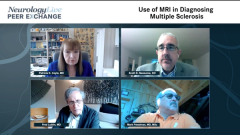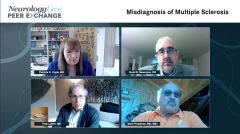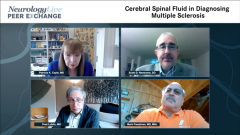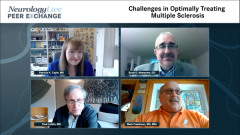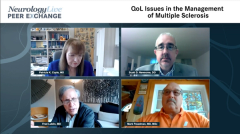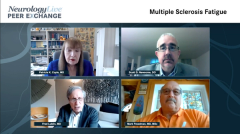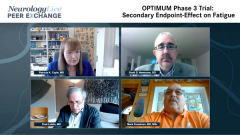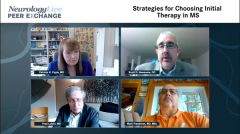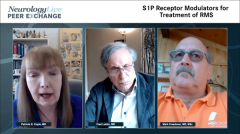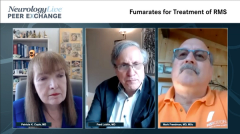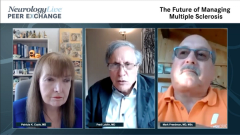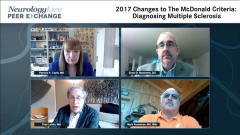
QoL Issues in the Management of Multiple Sclerosis
Episodes in this series

Experts talk through the comprehensive management of multiple sclerosis beyond disease-modifying therapy, including addressing quality-of-life factors, such as the need for symptomatic therapies and treating psychosocial issues.
Fred Lublin, MD: This gives us a good segue into the idea of how to provide total and holistic care for our patients with multiple sclerosis [MS]. It’s a complicated disorder and can produce multiple symptoms, impairments, and disabilities. We have been trying to practice the idea of comprehensive management of multiple sclerosis. Within the means of your center, you have to take care of multiple needs that they may have. This involves disease-modifying therapies [DMT] and also symptomatic therapies. This becomes very important to me. My colleague Stephen Krieger likes to say that no matter where you are in the spectrum of MS, there’s always something that the center can do to make someone’s life better. That includes addressing disease-modifying symptomatic therapies, social issues, how patients live with their impairments, how they interact with their environments, their coworkers, their family, psychological issues, and even insurance issues. We can discuss 2 different countries’ systems.
That’s the idea of comprehensive management. You’re taking care of all the patient’s needs. What’s unique in the MS population is that in many instances, because there are young people who don’t have much else in the way of health care needs, we’ve become their primary care doctors. We’re managing the part of their health care that is most concerning to them, and it makes for a fun practice to do that.
Let’s move into quality-of-life issues for our patients. Mark, go ahead and take the lead on that.
Mark Freedman, MD, MSc: This is a huge topic. It’s imperative that we not only make choices about disease-modifying medications but also answer questions. I answer questions on a blog, and it amazes me how many people are out there thinking that whatever disease-modifying medication they’ve been given is going to make their foot better, take away their pain, take away their fatigue, and improve their brain fog. Where do they get this from?
You have to say, “This is for your disease process, and we’re hoping to slow it down. We are seeing data now coming from the trials that if we’re successful at treating the actual disease, maybe some of these symptoms will get better too.” The hope is that the disease is driving these symptoms, but often there’s a big disconnect between the actual disease process and many of the day-to-day symptoms the patients are having. We have to pay attention to the day-to-day symptoms that are impairing their quality of life.
You can think, “They have a bad leg. But if their fatigue level isn’t a problem and they’re able to work, they may handle that leg with no problem at all.” Other people who those symptoms are not properly addressed are miserable. They’re often not terribly adherent to the therapies, and that leads to the other problem. If you don’t have adherence, you’re not going to get the benefit. It is a huge topic, and we have to be holistic with our patients.
We deal with our psychosocial issues differently between Canada and the United States. I don’t know that we’re better at doing it. We do have a lot of publicly funded systems, but they are hugely underfunded and private insurance often doesn’t cover a lot of this. I can’t get neuropsychological studies for my patients without them paying for it. I know some insurance in the United States will cover that. There is something to learn from each of our systems. I am a bit jealous because there’s a lot more available from some of the insurers who recognize the importance of quality of life. But we haven’t been able to get it through a publicly funded system in Canada.
Fred Lublin, MD: Scott?
Scott D. Newsome, DO: I agree with a lot of what Mark said. Early on, when I would have a patient sitting in front of me, I would get very excited about seeing no new lesions on the MRI. Their history doesn’t suggest a clinical attack, their bedside exam is stable, and I would tell the patient, “You’re absolutely doing great. This medication that we chose for you is doing what we had hoped it would.” Then the patient would say to me, “What about my fatigue? What about my cognitive fogging that has led to unemployment now? What about these day-to-day issues that I’m experiencing that are the bigger problem?” That was a real eye-opener for me in treating people and trying to work within the framework of that comprehensive care model.
We probably spend a lot more time trying to better understand the day-to-day struggles that our patients have after we get them diagnosed. We put them on the appropriate disease-modifying therapy that we think is right for them. Then we focus on a lot of those quality-of-life issues to help patients day-to-day, realizing that we’re likely going to be unsuccessful for some symptoms like fatigue and cognitive fogging.
Mark, you mentioned that the United States may be better in getting neuropsychological intervention and maybe CBT [cognitive behavioral therapy]. The bandwidth is terrible in the United States. We have a few people peppered throughout the United States for whom we’ll order the test and maybe it’s actually approved, but then you can’t find a person to do it or maintain following people over time. It’s an absolute disaster when it comes to mental health and cognitive follow-up, at least in the mid-Atlantic area.
Taking this comprehensive care approach is critical, and we have to continue doing that. We have to get better, honestly. As Mark mentioned, there are a lot of studies now showing what the impact is when you do this comprehensive care for our patients. Healthy lifestyle choices come into that model. There are studies showing the impact of unhealthy lifestyle choices vs healthy lifestyle choices. Treating the patient as a whole, beyond the DMT selection, is absolutely critical.
Fred Lublin, MD: You bring up a couple of interesting points. One is the modifiable risk factors that we can deal with. Smoking is a big 1, because that clearly makes MS worse and is clearly modifiable. Diet is still a difficult issue, as you know, Scott, because your institution and ours are both interested in looking at diet.
Neuropsychology is interesting. We employ a neuropsychologist, and we are now doing annual assessments on people. We’ve done reasonably well with getting it covered. It’s given us another metric to follow over time and look at. The important point here is that this is more than just disease-modifying therapies. We need to take care of the patient. The patient has to understand that there’s more to the care than disease-modifying therapies, and that they shouldn’t expect more from the disease-modifying therapy than it can do. It has very little effect on the symptomatic aspects of the disease. We’re coming into a new era in which the DMT may overlap with symptomatic therapy, and that’s what we’re going to get into next, once we have a broader understanding of fatigue.
Newsletter
Keep your finger on the pulse of neurology—subscribe to NeurologyLive for expert interviews, new data, and breakthrough treatment updates.

